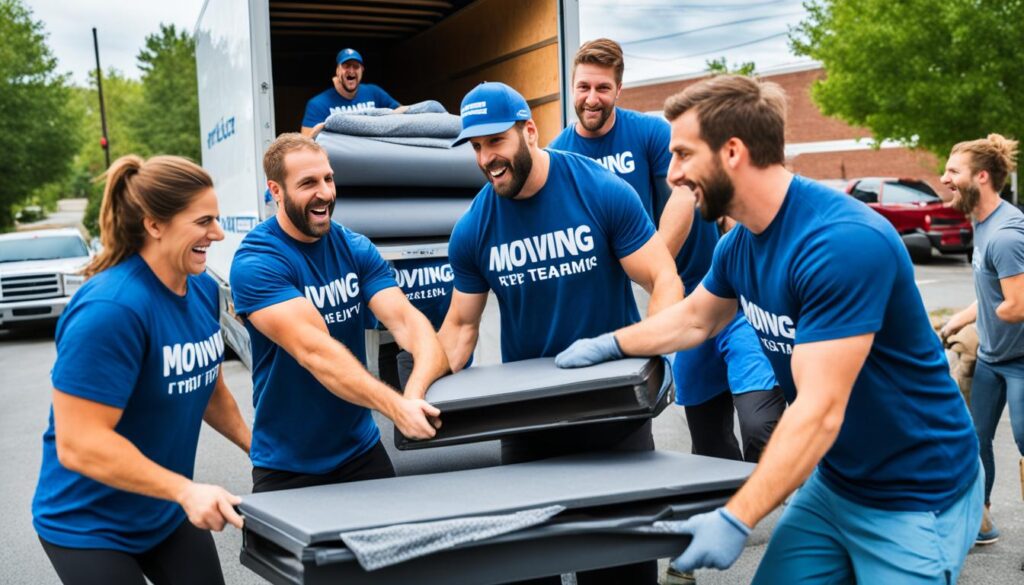
In this article, we will explore the importance of moving coordination and how teamwork can make the difference between a successful relocation and a chaotic one. We’ll provide valuable tips on how to optimize your moving coordination efforts, ensuring a seamless transition to your new home.
Key Takeaways
- Effective moving coordination and teamwork are crucial for a successful relocation.
- Building a strong team and delegating responsibilities evenly are essential for efficient moving coordination.
- Proper planning and organization, along with clear and open communication, contribute to a smooth and stress-free move.
- Handling logistics with precision and being adaptable to changes ensure a seamless transition.
- Celebrating milestones and progress and offering collaboration and support within the team create a positive moving experience.
The Key Role of Moving Coordination
Moving coordination is an essential component of a successful relocation. From meticulously planning every detail to managing logistics and executing the move with precision, effective coordination is the key to minimizing stress and ensuring a smooth transition to your new home.
When it comes to moving coordination, there are several key aspects that you should focus on to ensure a seamless experience:
- Developing a Comprehensive Moving Plan: A well-structured moving plan serves as a roadmap for your relocation journey. It includes tasks, timelines, and deadlines to keep you organized and on track.
- Coordinating Logistics: Logistics management is crucial for a successful move. From arranging transportation to coordinating the packing and unpacking process, effective logistics ensure that everything arrives at its destination safely and on time.
- Collaborating with Movers and Other Team Members: Whether you are working with professional movers or relying on the help of family and friends, clear communication and teamwork are essential. When everyone is on the same page and understands their roles and responsibilities, the moving process becomes much smoother.
- Stay Organized: Keeping track of important documents, contracts, and contact information is vital during a move. Staying organized not only saves time but also provides peace of mind knowing that everything is in order.
- Problem-Solving: Unexpected challenges may arise during a move. Being able to think quickly and find solutions on the spot is an essential skill for effective moving coordination.

By focusing on these key aspects of moving coordination, you can ensure a seamless and stress-free relocation experience. Whether you’re moving across town or to a different state, effective coordination is the cornerstone of a successful move.
Building a Strong Team for Your Move
A successful move heavily relies on teamwork. Whether you’re moving with family members, friends, or hiring professionals, building a strong team is crucial. With a collaborative and organized approach, you can ensure a smooth and stress-free relocation experience. Here are some valuable tips to help you build a strong team and optimize your moving coordination:
- Assign clear roles and responsibilities: Clearly define each person’s roles and responsibilities within the team. This will help avoid confusion and ensure that everyone knows what is expected of them.
- Communicate openly: Effective communication is key to successful teamwork. Regularly discuss plans, expectations, and any changes or challenges that may arise during the moving process.
- Encourage collaboration: Foster a collaborative environment where team members can share ideas, insights, and suggestions. Collaboration enables everyone to contribute their expertise and enhance the overall moving coordination.
- Support each other: Moving can be physically and emotionally demanding. Offer support and encouragement to your team members, especially during challenging moments. A positive and supportive atmosphere will boost morale and keep everyone motivated.
- Stay organized: Establish a centralized system for organizing moving-related information, such as schedules, paperwork, and contact details. This will ensure that everyone has access to necessary information and avoids any miscommunication or delays.
Building a strong team for your move is essential to streamline the moving coordination process. By following these tips, you can foster effective collaboration, enhance communication, and ensure that tasks are efficiently completed. Remember, a cohesive team will make your relocation experience more efficient and enjoyable.
“Teamwork is the ability to work together toward a common goal. It is the fuel that allows common people to attain uncommon results.” – Andrew Carnegie

Testimonials from Successful Movers:
| Name | Relocation Experience |
|---|---|
| Emily Johnson | “Working with a supportive moving team made the entire process much smoother. We were able to pack and unpack efficiently, and everyone knew what they needed to do. It eliminated a lot of stress and made the move enjoyable.” |
| Michael Thompson | “Collaborating with my friends during our move was a game-changer. We divided tasks, shared resources, and supported each other throughout the process. It made all the difference in turning a potentially stressful situation into an exciting adventure.” |
Planning and Organizing Your Move
Proper planning and organization are fundamental for successful moving coordination. By creating a comprehensive moving checklist, setting realistic timelines, and ensuring all necessary tasks are accounted for, you can stay on track and avoid last-minute surprises. Here are some essential tips to help you plan and organize your move effectively:
Create a Comprehensive Moving Checklist
An organized moving checklist is your best friend during the relocation process. List down all the tasks you need to accomplish, including packing, hiring movers, transferring utilities, and updating your address. Break down each task into smaller, manageable steps to make the process less overwhelming.
Set Realistic Timelines
Setting realistic timelines is crucial for a smooth move. Determine when you want to complete each task on your checklist and allocate sufficient time for each. Consider factors such as the size of your home, the distance of the move, and the amount of belongings you have. Give yourself some buffer time to handle unexpected delays or challenges.
Ensure All Necessary Tasks Are Accounted For
It’s essential to consider all the tasks associated with your move. Beyond packing and transportation, remember to address additional items such as canceling subscriptions, transferring medical records, and notifying relevant parties of your change of address. Make a comprehensive list of these tasks and incorporate them into your moving checklist.
Remember: A well-structured plan is the key to successful moving coordination. Take the time to create a detailed moving checklist, set realistic timelines, and consider all necessary tasks to ensure a smooth and stress-free relocation.
| Tips for Planning and Organizing Your Move |
|---|
| 1. Start planning early to allow ample time for preparations. |
| 2. Break down tasks into smaller steps to make them more manageable. |
| 3. Prioritize tasks based on urgency and importance. |
| 4. Create a timeline and stick to it to ensure a smooth flow of the moving process. |
| 5. Delegate tasks to family members or friends to distribute the workload. |
| 6. Use technology, such as moving apps or online calendars, to stay organized. |
| 7. Keep essential documents, such as contracts and contact information, readily accessible. |
| 8. Pack strategically, labeling boxes by room and keeping essential items separate. |
| 9. Notify the necessary parties, such as utility companies and schools, of your upcoming move. |
| 10. Stay flexible and adaptable, as unexpected changes may occur. |
Communicating Effectively
Effective communication is a vital aspect of successful moving coordination. Whether you’re coordinating with family, friends, or professional movers, open and clear communication is essential to ensure a seamless relocation experience. Proper communication enables you to address logistics, clarify expectations, and adapt to any changes that may arise during the moving process.
Here are some practical tips for maintaining seamless communication with your moving team:
- Establish clear lines of communication: Exchange contact information with everyone involved in the move, including phone numbers and email addresses. This ensures that you can stay connected and address any questions or concerns promptly.
- Hold regular team meetings: Schedule regular team meetings to discuss the moving plans, address any updates or changes, and assign tasks. These meetings keep everyone informed and enable effective collaboration.
- Use technology to your advantage: Take advantage of communication tools like group messaging apps or project management platforms. These platforms make it easy to share important information, documents, and updates with the entire team.
- Listen actively and be open to feedback: Effective communication involves active listening and being receptive to feedback. Encourage your moving team to express their thoughts and concerns, and address them constructively.
Quote:
“Communication is the key to success in any teamwork endeavor. When coordinating a move, it is crucial to establish open and transparent communication channels to facilitate a smooth and efficient process.” – Laura Johnson
Remember, effective communication fosters trust, clarifies expectations, and enables smoother teamwork throughout the entire relocation process. By prioritizing clear and open communication, you’ll enhance the moving coordination experience and ensure a successful move.

| Benefits of Effective Communication in Moving Coordination |
|---|
| 1. Minimizes misunderstandings and confusion |
| 2. Enhances coordination and collaboration |
| 3. Facilitates timely resolution of issues |
| 4. Keeps everyone informed and on the same page |
| 5. Builds trust and fosters teamwork |
Delegating Responsibilities and Tasks
Effective moving coordination relies on the proper delegation of responsibilities and tasks among your moving team. By assigning tasks based on individual strengths and expertise, you can ensure a balanced workload and a smoother relocation experience.
Here are some essential tips for delegation:
- Assess individual skills: Take the time to understand the unique abilities and strengths of each team member. This will help you determine the most suitable tasks for them.
- Communicate clearly: Clearly communicate the assigned tasks, expectations, and deadlines to each team member. This will help them understand their roles and responsibilities.
- Empower decision-making: Encourage team members to make decisions and problem-solve within their assigned tasks. Trusting their judgment will foster a sense of ownership and initiative.
- Provide support: Ensure that your team feels supported throughout the process. Be available to answer questions, provide guidance, and offer assistance when needed.
- Monitor progress: Regularly check in with your team to track progress and offer feedback. This will help you identify any potential issues early on and make necessary adjustments.
Remember, effective delegation not only lightens your load but also empowers your team members to contribute their expertise. By leveraging the strengths of each team member, you can enhance collaboration, efficiency, and overall moving coordination.
“Delegating work works, provided the one delegating works, too.”
– Robert Half
Task Delegation Example
| Team Member | Task |
|---|---|
| Emma | Packing fragile items |
| Liam | Disassembling furniture |
| Ava | Coordinating transportation |
| Noah | Arranging utilities transfer |

Handling Logistics with Precision
Logistics play a significant role in moving coordination. From coordinating transportation and packing materials to managing storage and utilities, it’s essential to handle logistics with precision to ensure a smooth and efficient move. Here are some expert tips that will help you navigate the logistical challenges of your move:
1. Plan Ahead for Transportation
Before the moving day arrives, take time to plan transportation logistics. Whether you’re hiring professional movers or renting a moving truck, make sure you schedule the necessary arrangements well in advance. This will help you secure the right size vehicle and avoid any last-minute complications. Additionally, consider any parking restrictions or regulations at your new location to make unloading easier.
2. Stock Up on Packing Materials
To ensure a successful move, gather all the necessary packing materials in advance. This includes sturdy boxes, packing tape, bubble wrap, and packing peanuts. Having these supplies readily available will streamline the packing process and protect your belongings during transit. Remember, proper packing is crucial for minimizing the risk of damage.
3. Label Everything
When packing your belongings, be diligent about labeling each box. Clearly indicate its contents and the room in your new home where it should be placed. This will not only save you time when unpacking but also help the moving team know exactly where each box should go. Consider using color-coding for even more efficient organization.
4. Set Up Storage Solutions
If there’s a gap between moving out of your current home and moving into your new one, you may need temporary storage for your belongings. Research storage options in advance and choose a facility that suits your needs. Additionally, make sure to organize your storage unit efficiently, allowing for easy access to items you may need before the final move.
5. Notify Utility Providers
Prior to moving day, contact your utility providers to schedule the disconnection of services at your old address and the connection of services at your new one. This includes electricity, gas, water, internet, and cable. By notifying these providers ahead of time, you can ensure a seamless transition and avoid any unforeseen disruptions.
With these tips, you’ll be well-prepared to handle the logistics of your move with precision. By taking the time to plan ahead and stay organized, you can minimize the stress and challenges often associated with moving coordination. Remember, a well-executed logistical plan is the key to a successful and seamless relocation.
Mitigating Potential Challenges
During the relocation process, moving coordination can encounter unexpected challenges. Being prepared, however, can help you navigate these obstacles smoothly. By anticipating common issues and having contingency plans in place, you’ll be better equipped to handle any curveballs that come your way.
Here are some practical strategies for mitigating potential challenges:
1. Planning for Delays and Setbacks
Moving is a complex process, and delays and setbacks can happen. It’s essential to build some buffer time into your moving schedule to account for unforeseen circumstances. Whether it’s a delay in getting packing supplies or a mix-up with the moving truck, having extra time will help you stay on track and minimize stress.
2. Dealing with Changes in Moving Dates
Occasionally, unexpected situations arise that require a change in your moving date. It could be a change in work commitments or unforeseen circumstances at your new home. Communicating promptly with your moving team and making adjustments in your moving plan will help ensure a smooth transition. Flexibility and open communication are key in handling date changes effectively.
3. Addressing Damages or Losses
Despite taking precautions, accidents can still happen during the moving process. It’s crucial to have appropriate insurance coverage for your belongings. Research different insurance options and select one that provides adequate protection. Take inventory of your items and document any pre-existing damages to ensure a seamless claims process should anything get lost or damaged during the move.
4. Managing Stress and Emotional Challenges
Relocating can be emotionally overwhelming for you and your moving team. It’s essential to prioritize self-care and support one another throughout the process. Take breaks, practice relaxation techniques, and encourage open communication to address any anxieties that may arise. A positive and supportive environment will help everyone navigate the emotional challenges associated with a move.
“Moving coordination requires planning, adaptability, and resilience. By preparing for potential challenges, you can turn unexpected obstacles into opportunities for growth and problem-solving.”
By implementing these strategies and maintaining a proactive mindset, you’ll be able to mitigate potential challenges and ensure a smoother relocation experience. Remember, moving coordination is a dynamic process, and being prepared for the unexpected will go a long way in making your move successful.
The Power of Collaboration and Support
Moving coordination is a team effort that thrives on collaboration and support. When everyone in your moving team works together, offering encouragement and supporting one another, the entire relocation process becomes more enjoyable and less stressful.
By embracing teamwork, you can tap into various benefits that enhance moving coordination. Let’s explore how collaboration and support can make your moving experience smoother and more rewarding:
Faster and More Efficient Execution
When you collaborate effectively with your moving team, tasks can be completed more efficiently. By dividing responsibilities and leveraging each member’s skills, you can accelerate the execution of necessary activities. This ensures that your move stays on schedule and reduces the risk of last-minute hiccups.
Sharing the Workload
Relocating involves numerous tasks and responsibilities. By working together, you can distribute the workload evenly among your team members. This not only prevents overload and burnout but also allows each person to focus on their assigned tasks, increasing productivity and minimizing mistakes.
Creative Problem-Solving
Collaboration brings diverse perspectives to the table, opening up opportunities for creative problem-solving. Different team members may have unique insights or alternative approaches to address challenges that arise during the move. By pooling your ideas and brainstorming together, you can overcome obstacles with ease and efficiency.
Emotional Support
Relocating can be an emotional experience, filled with both excitement and stress. A supportive moving team provides a valuable network of individuals who understand the challenges and can offer emotional support throughout the process. Sharing the journey with others creates a sense of camaraderie and makes the transition smoother.
“Teamwork is the ability to work together toward a common vision. The ability to direct individual accomplishments toward organizational objectives. It is the fuel that allows common people to attain uncommon results.” -Andrew Carnegie
Remember, success in moving coordination is not solely based on individual efforts, but it is a collective result of collaboration and support. So, build a strong moving team and empower each member to contribute their skills and expertise. Together, you can make your relocation a seamless and rewarding experience.
| Benefits of Collaboration and Support in Moving Coordination: |
|---|
| Faster and more efficient execution of tasks |
| Sharing the workload for a balanced experience |
| Increased creativity in problem-solving |
| Emotional support throughout the moving process |
Celebrating Milestones and Progress
Moving coordination is not just about accomplishing tasks; it’s also about celebrating milestones and progress. Recognizing and appreciating the efforts of your moving team is crucial for fostering a sense of achievement and camaraderie. By acknowledging important milestones throughout the moving process, you’ll keep the team motivated, energized, and committed to a successful relocation.
There are numerous ways to celebrate the milestones and progress achieved during your move. Consider the following ideas:
- Team recognition: Take the time to acknowledge the hard work and dedication of each team member. Show your gratitude through personal notes, small tokens of appreciation, or a team celebration.
- Reward system: Implement a reward system for accomplishing specific tasks or reaching significant milestones. This can be in the form of incentives, bonuses, or even a friendly competition among the team.
- Progress markers: Set up visual markers that represent the progress made during the moving process. For example, use a bulletin board to track completed tasks, or create a timeline that shows the milestones achieved.
Celebrating milestones not only boosts morale but also reinforces the importance of teamwork and moving coordination. It serves as a reminder of the progress made and motivates team members to continue working together effectively.
“Teamwork is the ability to work together toward a common vision. The ability to direct individual accomplishments toward organizational objectives. It is the fuel that allows common people to attain uncommon results.” – Andrew Carnegie
Remember, every successful milestone is an opportunity to appreciate the efforts of your team members and recognize the power of collaboration in achieving a smooth and stress-free relocation.
Next, we’ll explore how to adapt to changes that may arise during the moving process, ensuring your moving coordination remains effective, no matter the circumstances.
Adapting to Changes
Relocations often come with unexpected changes and adjustments. When it comes to moving coordination, being flexible and adaptable is essential for a smooth transition. Here are some valuable tips to help you navigate unforeseen circumstances and ensure your moving coordination remains effective:
- Expect the unexpected: Understand that not everything will go as planned during a move. Stay mentally prepared for changes and be open to adjusting your strategy.
- Stay organized: Maintain a well-structured plan and checklist, but be ready to adapt if circumstances change. Prioritize tasks and adjust timelines accordingly to accommodate any new developments.
- Communicate openly: When faced with changes, keep your moving team informed. Effective communication is key to ensuring everyone is on the same page and can adjust their roles and responsibilities accordingly.
- Embrace creativity: Challenges often present opportunities for innovative solutions. Think outside the box and explore different approaches to overcome unexpected obstacles.
- Remain positive: Moving can be stressful, especially when things don’t go as planned. Maintain a positive mindset and focus on finding solutions rather than dwelling on the challenges.
Remember, adaptability is a valuable trait when it comes to moving coordination. By embracing changes and adjusting your plans accordingly, you’ll minimize stress and ensure a successful relocation.
“The measure of intelligence is the ability to change.” – Albert Einstein
Adapting to Unexpected Delays
Delays can be one of the most common and frustrating changes during a move. Here are a few additional tips to help you adapt to unexpected delays:
- Stay in touch with your moving company and keep updated on any potential delays in transportation.
- Have a backup plan for temporary accommodation if there are delays in accessing your new home.
- Use the extra time to organize and declutter your belongings, making the most of the delay.
- Stay patient and maintain open communication with your moving team, ensuring everyone is aware of the situation and adapting their plans accordingly.
By anticipating and embracing changes, you’ll be prepared to handle unexpected circumstances and keep your moving coordination efforts on track.
Conclusion
In conclusion, mastering moving coordination through effective teamwork is crucial for a successful relocation. By following the tips and insights provided in this article, you’ll be well-prepared to navigate the challenges of planning, organizing, and executing your move.
For more information, assistance, or to explore further moving coordination resources, visit unitedmovingmanagement.com. With their expertise and support, you can make your move a smooth and stress-free experience.
Remember, the power of teamwork is the key to a successful relocation. By working together, communicating effectively, and delegating tasks, you’ll ensure a seamless transition to your new home. Good luck with your move!



